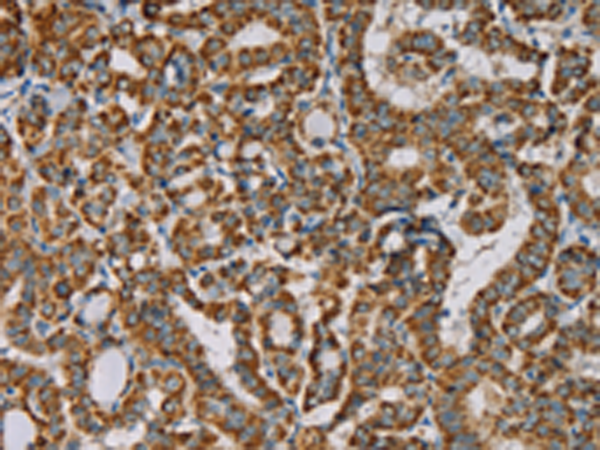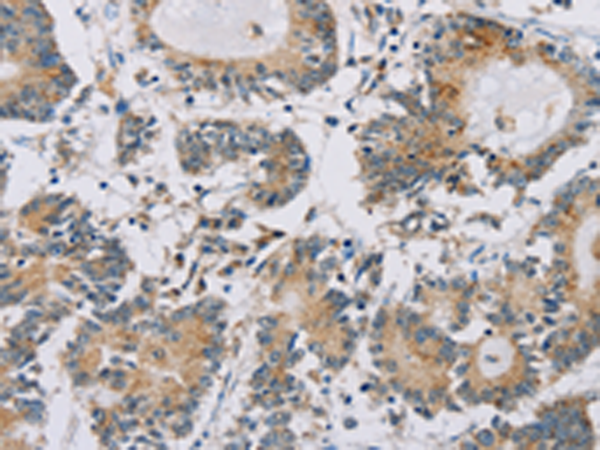

| WB | 咨询技术 | Human,Mouse,Rat |
| IF | 咨询技术 | Human,Mouse,Rat |
| IHC | 1/50-1/200 | Human,Mouse,Rat |
| ICC | 技术咨询 | Human,Mouse,Rat |
| FCM | 咨询技术 | Human,Mouse,Rat |
| Elisa | 1/2000-1/5000 | Human,Mouse,Rat |
| Aliases | LGL2; IMP13; KAP13; RANBP13 |
| Host/Isotype | Rabbit IgG |
| Antibody Type | Primary antibody |
| Storage | Store at 4°C short term. Aliquot and store at -20°C long term. Avoid freeze/thaw cycles. |
| Species Reactivity | Human, Mouse, Rat |
| Immunogen | Fusion protein of human IPO13 |
| Formulation | Purified antibody in PBS with 0.05% sodium azide and 50% glycerol. |
+ +
以下是3篇与IPO13抗体相关的文献概览:
1. **文献名称**: "Importin 13 regulates nuclear transport of Oct4 transcription factor in embryonic stem cells"
**作者**: Wang Y et al.
**摘要**: 本研究利用特异性IPO13抗体,通过免疫共沉淀和RNA干扰技术,揭示了IPO13在胚胎干细胞中调控Oct4转录因子核转运的关键作用,证实其与干细胞多能性维持相关。
2. **文献名称**: "A monoclonal antibody targeting Importin 13 inhibits ovarian cancer cell proliferation in vitro"
**作者**: Li H et al.
**摘要**: 研究团队开发了一种抗IPO13的单克隆抗体,通过体外实验证明其能有效阻断卵巢癌细胞核转运通路,抑制肿瘤细胞增殖并诱导凋亡,为靶向治疗提供新思路。
3. **文献名称**: "Importin 13 modulates TGF-β signaling through nuclear translocation of Smad proteins"
**作者**: Zhang R et al.
**摘要**: 利用IPO13抗体进行免疫荧光和Western blot分析,发现IPO13通过介导Smad蛋白的核转运参与TGF-β信号通路调控,影响细胞分化及纤维化过程。
---
*注:若需具体文献,建议通过PubMed或SciHub输入标题检索原文。部分研究可能需结合上下文判断抗体应用细节。*
The IPO13 antibody targets Importin 13 (IPO13), a member of the importin β family of nuclear transport receptors. IPO13 facilitates the nucleocytoplasmic shuttling of proteins and RNA by binding cargoes via specific recognition signals and interacting with the Ran GTPase cycle. Unlike many importins, IPO13 functions bidirectionally, mediating both nuclear import and export. Structurally, it contains characteristic HEAT repeats that enable cargo binding and RanGTP interaction.
IPO13 plays roles in diverse cellular processes, including transcriptional regulation, RNA processing, and developmental signaling. It transports critical cargos such as transcription factors (e.g., Pax6), RNA-binding proteins, and components of the ubiquitin-proteasome system. Studies link IPO13 to embryogenesis, stem cell differentiation, and tissue homeostasis, with knockout models showing developmental defects in mice.
In disease contexts, IPO13 dysregulation is implicated in cancer progression, neurodegenerative disorders, and viral infections. For instance, altered IPO13 expression affects the subcellular localization of oncoproteins or tumor suppressors, influencing cancer cell proliferation and metastasis. The IPO13 antibody is widely used in research to detect IPO13 expression levels, map its cellular localization via immunofluorescence or Western blotting, and investigate its cargo-specific transport mechanisms. Its applications extend to studying pathological mechanisms and potential therapeutic targets in diseases linked to nucleocytoplasmic transport defects.
×